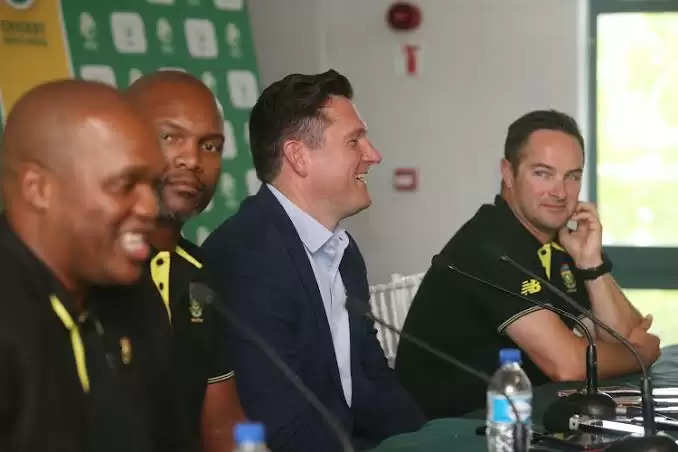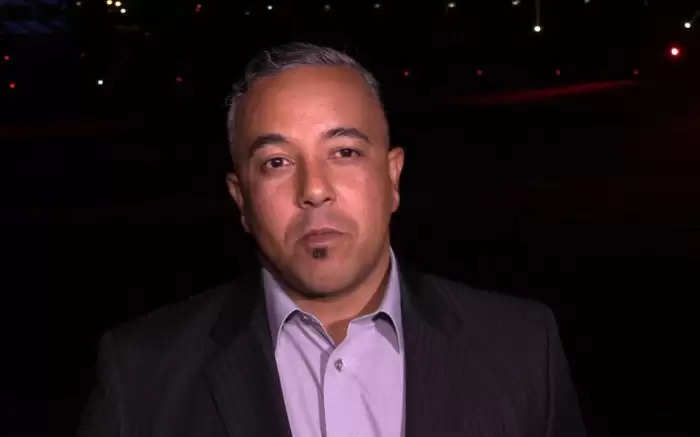SJN Hearings: Paul Adams the latest to accuse South Africa head coach Mark Boucher and teammates of racial discrimination

Former South Africa wrist-spinner Paul Adams has revealed how he was subjected to racial discrimination and name-calling during the playing days by his former teammate and current Proteas head coach Mark Boucher among others.
Adams, known for a uniquely-built bowling action, played 45 Tests and 24 ODIs for South Africa from 1995 to 2004, a span during which, he says, he experienced several instances of being subjected to racial discrimination by his own teammates.
ALSO READ: Yorkshire refuse to run injured batter out
Paul Adams opened up on the issue while speaking at Cricket South Africa’s (CSA) Social Justice and Nation-Building hearings, stating how he was referred to as “brown s***” by some of the fellow cricketers, who regularly hurled racial slurs at him. Paul Adams said he faced racial discrimination on colour basis even after he was done playing and entered the coaching arena.


Paul Adams has accused former teammate Mark Boucher of calling him “brown s***” (pic courtesy: Twitter)
“I was called brown s*** when I was playing. It often used to be a song when we won a game and we were in fines’ meetings. They would sing, ‘brown s*** in the ring, tra la la la laa,'” Adams was quoted as saying in the SJN Hearings.
“When you are playing for your country, when you have had that victory, you don’t make sense of it, you brush it off, but it’s blatantly racist. Some people will say unconscious bias and they weren’t aware but this is why we are here – to change that.”
Paul Adams said it was his girlfriend at the time (now his wife), who first talked to him about it, saying it wasn’t at all right of his teammates to be calling him “brown s***”.
“It’s one that stayed with me,” Adams said, reminiscing of the conversation. “My now wife, back then my girlfriend, she would always make a comment to me about it. She (asked): ‘Why are they talking to you like that?’ ‘Why would they call you that name?’ ‘It’s not right.’ I would just shrug it off.”
Paul Adams had not initially taken Boucher’s name, but he did later concede he was indeed one of those who subjected him to racial discrimination. “I never addressed it with him,” he said. “Mark was just one of the guys (who called me that)… it only came back to me afterwards.”
“I’m just highlighting that it should never happen and if we take this forward in the right way, we will have a lot more respect for each other. Maybe he (Boucher) should come and say sorry. Maybe that is all that needs to happen.”
Group of white players named “big five” controlled South African cricket: Roger Telemachus
Before Paul Adams made his disappointing experience about racial discrimination within the South African change room public, another former cricketer, pacer Roger Telemachus, made a revelation of his own about the Proteas dressing room.
Speaking to the CSA commission, Telemachus, who featured in 37 ODIs and three T20Is for Proteas, brought to light a clique of white players named “big five”, who, according to him, controlled the decision making within South African cricket.
Telemachus said the moniker “big five” was conceived by him at the 2007 World Cup in the Caribbean, where he did not play a single game in South Africa’s run to the semi-final.
“That is where the big five started. They control selection. They control everything. They used to go to the coach and say this is how we are going to play. This is where we gave the name to these players,” he said, as per ESPNcricinfo.
Telemachus did not reveal names of the men involved in the “big five”, but said they were all white cricketers, who were partly responsible for him not playing at all during the World Cup in West Indies.
Not only was Telemachus made to warm the benches through the World Cup, he was also left out of the squad thereafter and never got picked again – something, he claims, he was never explained why? “When I confronted them, they couldn’t give me answers. Even when we returned from West Indies I never got answers.”
South African cricket run by a group of “senior players”, accused Herschelle Gibbs
Telemachus’ revelation isn’t the first time a group of white men in the team have been accused of running and controlling South African cricket during their playing days. Former opening batsman Herschelle Gibbs had written in his 2010 released autobiography how a group of senior players were responsible for the entire show.
ALSO READ: DRS CONFUSION IN SURYAKUMAR NON-DISMISSAL
His accusation involved these players not letting the then coach Mickey Arthur have a say in things. Gibbs claimed some of South African cricket’s most prominent names to be part of this group.
“The team has been criticised for being run by a group of senior players — captain Graeme Smith, Jacques Kallis, Mark Boucher and, more recently, AB de Villiers — and this inner circle splits the team in two and makes any chance of developing true team spirit among the Proteas impossible,” Gibbs had accused in writing.
“Simply put, without Graeme’s backing, Mickey didn’t have much influence over the guys. In the end, Graeme was simply too powerful.”
“I was forever lonely”, Makhaya Ntini opens up on racial bias faced during his playing days
At the height of the ‘Black Lives Matter’ campaign last year, former pacer Makhaya Ntini too had recalled his experience of facing racial discrimination within South African cricket. Ntini, who in 1998 became the first black male cricketer to represent South Africa in Tests, said he was subjected to indifferent treatment and made to feel lonely by his teammates.
“I was forever lonely at the time,” Ntini said in an interview with South African Broadcasting Corporation. “Nobody knocked on my door to go for dinner. Teammates used to make plans right in front of me, skipping me out. When walking into the breakfast room, nobody came to sit with me.”
“We wear the same uniform and sing the same national anthem, but I had to overcome (the isolation),” he added.
Ntini, who featured for Proteas in 101 Tests, 173 ODIs and 10 T20Is, also said he used to avoid travelling to grounds via the team bus and instead preferred making up distance by himself because of the way he was made to feel.
“I used to see the driver of the team bus, give him my bag, and then I would run to the cricket ground. I did the same thing on the way back, I just ran back instead,” Ntini had said.
“People never understood why I did that, I never told them what I was trying to avoid. It became my best thing, I didn’t have to face any of it.”
“I was running away from the loneliness. If I was sitting at the back of the bus, they would go and sit at the front. Whenever we won, it was joyful but I was the first to be blamed whenever we lost,” he added.
“My mother was kicked out of the presidential suite at the stadium”, Lonwabo Tsotsobe reveals
Further in submissions made to the CSA commission was the shocking revelation made by fast bowler Lonwabo Tsotsobe, who said his mother was once told to step out of the presidential suite of a stadium in South Africa.
Tsotsobe opened up on his own experiences of dealing with indifferential treatment on the basis of his colour, stating also how he had to carry the bags of senior players, which wasn’t the case for any young white South African player part of the same group.
“I will share one or two occurrences that might open your eyes,” he wrote to the SJN ombudsman. “When I was initially selected to represent the Proteas on tour, I had to carry the bags of senior players onto the bus.
“At the time I thought it was part of an initiation extended to any new player in the team.”
“To my astonishment, later when I became a senior player, none of the newly selected white players were subjected to the so-called initiation practice.”
Tsotsobe did not name the stadium where his mother was not allowed to enter the presidential suite or the date or year of the game. But he wrote to the commission that he did not take the incident lightly and stood firmly against it, threatening to not take the field until his mother was given the same treatment accorded to the “white folks”.
“There was also an occasion when my mother was kicked out of the presidential suite at the stadium and the reason given was that the suite was full with white families,” he said. “However, I did not take this blatant racially motivated act lying down.”
“I remonstrated and told them that I will not grace the field and play unless my mother was afforded the same treatment and status just like the white folks. After such an argument she was allowed into the suite,” Tsotsobe added.
“The team was divided”, Loots Bosman cites poor culture behind South Africa’s World Cup misery
Former batsman Loots Bosman is another black South African cricketer who has made accusations of indifferential treatment on the Proteas team management during his stay with the side.
In the CSA organised SJN hearings, Bosman went to the extent of saying that Proteas’ inability to win a major global tournament is down to a poor culture within the team, with some of the talented black players left feeling excluded by their white teammates.
Bosman wrote from his experience within the squad during his international career span, including the 2007 50-over World Cup in the Caribbean and the T20 World Cup in England three years later, both of which South Africa failed to win.
“There was no chance of us winning a World Cup. The team was divided,” Bosman said at the SJN hearings. “We go into camps where we buy into one thing and then you deal with the same person who treats you like you don’t exist. How are you going to win a World Cup when you don’t back the guy next to you?”
Bosman also detailed instances of facing foul language from his teammates, who denigrated him. “The environment was bad,” he said. “Most of the time, the guys don’t greet you. They will just look at you. You could see they don’t care that you are greeting. They literally look the other way. They made you feel as though you don’t belong there.”
“Most of the time, we [players of colour] were carrying drinks. You could see when you go and take something, for instance if someone is batting and someone needs gloves, you have to rush to the dressing room and grab someone’s gloves, and you walk in while they are talking and when you hear things they are talking about. It was sad.”
“There was an occasion where I was 12th man and you literally can’t look away. There was a time when I didn’t see someone wanted something. These guys would shout and say, ‘f****** wake up, stop sleeping’. That language was a normal thing. The management could hear that too.”
Bosman highlighted how lack of proper communication from the team management robbed him of his only chance to bat during the 2007 World Cup.
“I was told I would bat at No. 3 (in the Super 8 game against West Indies). I was told to pad up but then a wicket fell and I was told, ‘You’re not batting.’ Then another wicket fell. And I didn’t go. I ended up not batting. And the next game I was dropped. How can I be dropped? I did nothing. I didn’t bat and when I was supposed to bat, I kept being shunted down the order.”
Bosman joined the list of players to bring a clique of white players to the spotlight. While like Telemachus, he also did not name any of the “big five” individuals, the player indicated they were all specialist batters like him and were responsible for the inappropriate handling of black cricketers within the group.
“There has always been this thing that there are no black batters. There are black batters but they are not being used. I was there,” Bosman said. “When you are competing with white players and you are black, you have no chance. When you are black, you are going to struggle.”
In conclusion, the former batsman said he spoke on the matter of colour-based prejudice within South African cricket on the behalf of many former and current players, who could not open up on their issues fearing repercussions.
“I don’t just speak for myself. I spoke for the retired black players. We are all in this. There are a lot of current players who are scared to say something. We are all suppressed and neglected. We lost a lot and we are hurting inside,” Bosman said.

